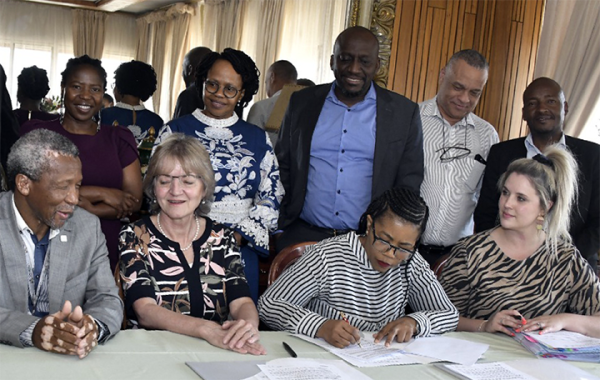Unisa’s Experimental Farm Elevates Agricultural Research and Training to New Heights
The signing ceremony saw the presence of the PVC, as signatory on behalf of Unisa, supported by members of the institution’s executive leadership, including Prof Thenjiwe Meyiwa, Vice-Principal: Research, Postgraduate Studies, Innovation and Commercialisation, Prof Solomon Magano, Acting Vice-Principal: Institutional Development, Matsiababa Motebele, Vice-Principal: Operations and Facilities, Byron Stanfliet, Acting Chief Financial Officer, and Prof Ntanganedzeni Mapholi, Deputy Executive Dean of the College of Agriculture and Environmental Sciences. This diverse representation reflects the integrated approach the university takes in managing and advancing its operations. Present also was the seller and legal representatives for both parties.
Addressing global challenges through agriculture
The PVC commended the College of Agriculture and Environmental Sciences for its foresight in addressing pressing global challenges through agricultural education and research. “Agriculture plays a pivotal role in addressing issues like food security, climate change and economic development,” she stated. “This farm is not just a site for agricultural production, but a space for multidisciplinary transformation. It will allow us to train future business leaders and entrepreneurs, while also fostering a deep respect for the land and an understanding of indigenous knowledge systems.”
She continued: “This acquisition will open doors to new possibilities in sustainable farming practices, climate change research, food security and innovation in agriculture. It reflects Unisa’s commitment to creating an environment that supports academic excellence and practical learning, benefiting not only our students but society at large.”
The PVC stressed the importance of integrating diverse knowledge systems, especially in the aftermath of global challenges like the Covid-19 pandemic. She sees the farm as a place where science, research and traditional knowledge can come together to create meaningful impact.
A hub for innovation and practical learning
The newly acquired farm is set to become a centre for teaching, research and community involvement. The farm will support practical training for both undergraduate and postgraduate students, fostering cutting-edge research and driving innovation in the field of agriculture. It will also serve as a platform for entrepreneurship and commercialisation, with a strong emphasis on community engagement, particularly with the local municipality.
Mapholi emphasised the significance of the acquisition. “Today,” she said, “marks the beginning of an exciting new chapter for Unisa. This farm will play a crucial role in training our students, advancing research and development, and engaging with the community. The farm will host a variety of units, including smart greenhouses, an automated dairy farm, and small stock facilities for sheep and goats. Our goal is to create models that can be shared with smallholder farmers, helping to improve their practices.”
The farm will also house several research facilities, including a veterinary laboratory and clinic, where students and researchers will focus on animal health and veterinary science. Other key components of the farm will include units for pigs, large stock (beef and dairy), poultry production, horticulture, aquaculture, food processing, and an omics and drug discovery centre.
Strategic imperative for student learning
Magano expressed delight at the acquisition, highlighting the critical role of practical learning in agriculture. He said: “This farm will enhance the training of our students and support the strategic imperatives of both the college and the university as a whole. It will also provide a space for our highly qualified academics in agriculture and animal health to further their research. The veterinary clinic will be fully resourced and serve as a centre for animal testing and drug discovery, strengthening our capacity in veterinary health.”
For students, the farm will offer hands-on experience and practical exposure to agricultural techniques, contributing to the development of skills necessary for success in the field. Moreover, postgraduate students will have access to facilities that support advanced research and entrepreneurship, ensuring that they can contribute to both academic knowledge and real-world applications.
A vision for entrepreneurship and community engagement
Motebele shared the university’s excitement about the acquisition. “This project has been a long time in the making, and we are thrilled to see it come to fruition,” he said. “The farm will not only support academic research but will also serve as a hub for entrepreneurship, helping students transition from education to business. This is a community engagement initiative, and we believe the farm will have a positive impact on the local communities, contributing to society at large.”
Motebele further noted that property management played a key role in ensuring that the farm was purchased at a market-related price. He emphasised that the new developments planned for the farm will make it a vital resource for Unisa’s students, researchers and the surrounding community.
A new chapter for Unisa
The acquisition of the experimental farm marks a new chapter in Unisa’s efforts to contribute to agricultural research, innovation and education in South Africa. With plans for smart farming, veterinary research and entrepreneurial development, the farm will be a critical resource for students, faculty, and the broader community. By investing in practical learning and community-based projects, Unisa is positioning itself as a leader in agricultural sciences and a key player in addressing some of the most urgent challenges facing the continent and the world.
The university is now set to transform the farm into a vibrant centre of learning and discovery, one that will empower future generations of agricultural professionals and innovators.
The experimental farm will undoubtedly become a cornerstone for the College of Agriculture and Environmental Sciences, playing a crucial role in advancing Unisa’s goals of enhancing research capacity and fostering innovative solutions to real-world challenges. As the university continues to lead in various academic and research fields, this initiative sets the stage for future successes that will further solidify Unisa’s reputation as a global leader in higher education.

